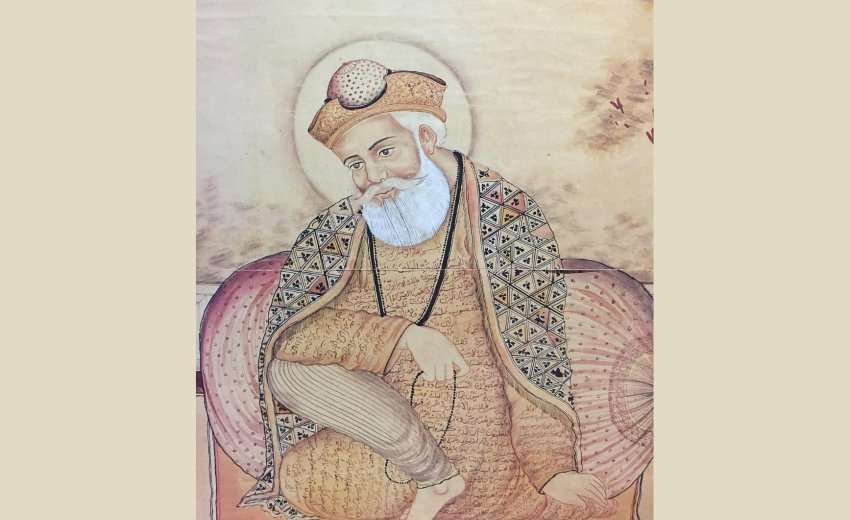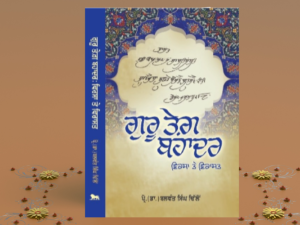Guru Nanak was a born revolutionary. He revolted against the established religious practices at a very young age. At the age of nine, the family called the Purohit (family priest) to initiate Nanak into Hindu Dharma through Janeau ceremony, where it becomes obligatory to wear a cotton thread over the body of an initiate. It was held as a social custom and all relatives and village community was invited to participate. The young Nanak refused to wear the sacred thread which was an affront to the family and the Hindu clergy called to perform the ritual. Nanak surprised everyone present by his logical reasoning, “What is the use of wearing this cotton thread if it is not made of mercy, contentment, continence and truth, and will not last till the end”.
1. Social and Cultural Revolution [1]: Guru Nanak’s advent (1469-1539) is an epoch-making singular event in the recorded history of the world. His unique, revolutionary and liberating philosophy of universal humanism – liberty, love, respect, justice and equality, is relevant for all times and applicable for all. Guru Nanak describes the rampant moral degeneration that plagued the society: tyranny, injustice, cruelty, greed, corruption, exploitation, falsehood, hypocrisy, pretension, deception and self-conceit. Not only was he deeply anguished by the sheer ignorance of the masses and their exploitation by the powerful assembly of elite ranks comprising rulers, government administrators, clergy and the rich, but also the heartbreaking conditions of untouchables/outcastes and women who were thrust at the lowest rung of the social order. He condemned the elite elements vigorously by calling spade a spade:
ਕਲਿ ਕਾਤੀ ਰਾਜੇ ਕਾਸਾਈ ਧਰਮੁ ਪੰਖ ਕਰਿ ਉਡਰਿਆ ॥
ਕੂੜ ਅਮਾਵਸ ਸਚੁ ਚੰਦ੍ਰਮਾ ਦੀਸੈ ਨਾਹੀ ਕਹ ਚੜਿਆ ॥
It is a murderous age, the kings are butchers, and righteousness has taken on wings. It is the dark Amaavas night (fifteenth night of the descending moon) of falsehood as the moon of Truth does not rise anywhere.
(SGGS, M 1, p. 145)
Guru Nanak preached universal brotherhood and amity among communities and nations. He advocated abolition of all distinctions based on caste and creed. He proclaimed:
ਸਭੁ ਕੋ ਊਚਾ ਆਖੀਐ ਨੀਚੁ ਨ ਦੀਸੈ ਕੋਇ ॥
ਇਕਨੈ ਭਾਂਡੇ ਸਾਜਿਐ ਇਕੁ ਚਾਨਣੁ ਤਿਹੁ ਲੋਇ ॥
Call every one high, none is low, The only potter (One Lord) had fashioned all alike. And his light pervades all creation.
(SGGS, M 1, p. 62)
ਜਾਣਹੁ ਜੋਤਿ ਨ ਪੂਛਹੁ ਜਾਤੀ ਆਗੈ ਜਾਤਿ ਨਹੇ ॥
Recognize the Lord's Light within all, and do not consider social class or status; there are no classes or castes in the world hereafter
(SGGS, M 1, p. 349)
To give a practical shape to his teachings in this regard, he introduced the system of langar (community kitchen) and pangat (persons sitting together in rows to eat) at Kartarpur. Here he himself dined with people of all castes and classes, high and low. A spirit of sacrifice, service and brotherhood was developed and the langar became a symbol of equality, fraternity and brotherhood.
Guru Nanak practiced what he preached at Kartarpur. He put his ideals into practice so that there is no dichotomy between his thought and action. He rejected ascetic way of life prevalent in Hindu society as a hallmark of achieving liberation from bonds of worldly life. Guru advocated life of a householder and himself lived it in Sultanpur Lodhi before embarking on his preaching mission. The Sikh Gurus elevated marriage from temporal level to spiritual union of the couple. The Sikh faith allows full blossoming of worldly life without putting up any restrictions:
ਹਸੰਦਿਆ ਖੇਲੰਦਿਆ ਪੈਨੰਦਿਆ ਖਾਵੰਦਿਆ ਵਿਚੇ ਹੋਵੈ ਮੁਕਤਿ ॥
One could attain liberation while enjoying life
(laughing, playing, eating good food and wearing good clothes).
(SGGS, M 5, p. 522)
Indian society was a sort of rigmarole of customs, creeds and taboos but Guru Nanak wanted to overthrow all the impediments. Women were treated at par with Sudras or untouchables in Indian society. Guru Nanak brought redemption of Indian women by singing paeans of her virtues in his writings. It was the pathetic condition of women and downtrodden (Sudras and Untouchables) to which Guru Nanak responded by pouring out his concern and sympathy and openly declaring his solidarity with the lowest of the low in society:
ਨੀਚਾ ਅੰਦਰਿ ਨੀਚ ਜਾਤਿ ਨੀਚੀ ਹੂ ਅਤਿ ਨੀਚੁ॥
ਨਾਨਕੁ ਤਿਨ ਕੇ ਸੰਗਿ ਸਾਥਿ ਵਡਿਆ ਸਿਉ ਕਿਆ ਰੀਸ॥
ਜਿਥੈ ਨੀਚ ਸਮਾਲੀਅਨਿ ਤਿਥੈ ਨਦਿਰ ਤੇਰੀ ਬਖਸੀਸ॥
Those who are lowest of the low class, the very lowest of the low;
Nanak will stand by the lowest of lowest, not with the elite.
Societies that take care of the downtrodden have the blessing of God.
(SGGS, M 1, p. 15)
He questioned and condemned religious beliefs and social customs that discriminate against women and held the custodians of society responsible for the degradation of women:
ਭੰਡਿ ਜੰਮੀਐ ਭੰਡਿ ਨਿੰਮੀਐ ਭੰਡਿ ਮੰਗਣੁ ਵੀਆਹੁ॥
ਭੰਡਹੁ ਹੋਵੈ ਦੋਸਤੀ ਭੰਡਹੁ ਚਲੈ ਰਾਹੁ ॥
ਭੰਡੁ ਮੁਆ ਭੰਡੁ ਭਾਲੀਐ ਭੰਢਿ ਹੋਵੈ ਬੰਧਾਨੁ ॥
ਸੋ ਕਿਉ ਮੰਦਾ ਆਖੀਐ ਜਿਤ ਜੰਮਹਿ ਰਾਜਾਨ॥
ਭੰਡਹੁ ਹੀ ਭੰਡੁ ਊਪਜੈ ਭੰਡੈ ਬਾਝੁ ਨ ਕੋਇ ॥
ਨਾਨਕ ਭੰਡੈ ਬਾਹਰਾ ਏਕੋ ਸਚਾ ਸੋਇ ॥
ਜਿਤੁ ਮੁਖਿ ਸਦਾ ਸਾਲਾਹੀਐ ਭਾਗਾ ਰਤੀ ਚਾਰਿ ॥
ਨਾਨਕ ਤੇ ਮੁਖ ਊਜਲੇ ਤਿਤੁ ਸਚੈ ਦਰਬਾਰਿ ॥
It is woman who gives birth to a child. It is she who conceives and nourishes the fetus inside her womb. It is woman whom man betroths and marries. It is woman whose company he seeks. It is she who nurtures and sustains the human race. When wife dies, man seeks another one. It is she through whom relations are established. How could she who gives birth to kings/great men be considered inferior? It is she who gives birth to another woman. No one could be born without woman. O Nanak, only the “True One” is independent of woman. Whosoever, whether man or woman sings the glory of God is blessed with joy and beauty. Nanak, such faces will be radiant in the court of the True One.
(SGGS, M 1, p. 473)
This hymn is a rebuke to the patriarchal culture, as it is addressed to men, especially rulers/leaders who were the guardians of socio-religious order. Further, he declares that woman is the hub of humanity, the lifeline of humanity. It is woman who conceives, it is woman who nurtures humanity from birth to death. Moreover, he puts woman at the apex of “human evolution” by declaring that only God is independent of woman.
All social revolutions are harbingers of cultural revolutions. Guru Nanak observed that Indian elite started playing a subservient role to gain power and pelf from the ruling class. He exhorts the elite of Hindu society not to forsake their religious practices, language and culture to placate their rulers:
ਖਤ੍ਰੀਆ ਤ ਧਰਮੁ ਛੋਡਿਆ ਮਲੇਛ ਭਾਖਿਆ ਗਹੀ ॥
ਸਿ੍ਸਟਿ ਸਭ ਇਕ ਵਰਨ ਹੋਈ ਧਰਮ ਕੀ ਗਤਿ ਰਹੀ ॥
The K'shatriyas have abandoned their religion, and have adopted a foreign language. The whole world has been reduced to the same social status; the state of righteousness and Dharma has been lost.
(SGGS, M 1, p. 663)
Guru Nanak was highly critical of hypocrisy of Hindu officials who were playing a second fiddle to their Muslim rulers. He condemned their double standards of playing a lip service to their Brahman clergy while sharing their social customs with the Muslim rulers:
ਗਊ ਬਿਰਾਹਮਣ ਕਉ ਕਰੁ ਲਾਵਹੁ ਗੋਬਰਿ ਤਰਣੁ ਨ ਜਾਈ ॥
ਧੋਤੀ ਟਿਕਾ ਤੈ ਜਪਮਾਲੀ ਧਾਨੁ ਮਲੇਛਾਂ ਖਾਈ ॥
ਅੰਤਰਿ ਪੂਜਾ ਪੜਹਿ ਕਤੇਬਾ ਸੰਜਮੁ ਤੁਰਕਾ ਭਾਈ॥
ਛੋਡੀਲੈ ਪਾਖੰਡਾ ॥
ਨਾਮਿ ਲਇਐ ਜਾਹਿ ਤਰੰਦਾ॥
You (Khatri official) are taxing the cow and Brahman whom you worship; you are mistaken if you think that cow-dung coating of your kitchen floor would absolve you of your sins. You put-on a ritual mark on your forehead, wear a dhoti (loin-cloth worn around the waist) and carry a rosary, but you eat the food of Muslims [you are dependent on the Muslim ruler (malechh) to make a living]. You perform Hindu worship secretly but you behave like Muslims outside and read Quran with them. Give up this hypocrisy! Salvation lies in practicing Truth.
(SGGS, M 1, p. 471)
2. Political Ideas of Guru Nanak: Guru Nanak wanted to raise the conscience of Indian society by his exhortations to live a life of honour and dignity without making any compromise with the diktats of rulers. If one submits to injustice or tyranny without moral resistance then all efforts to subsist are fruitless:
ਜੇ ਜੀਵੈ ਪਤਿ ਲਥੀ ਜਾਇ ॥ਸਭੁ ਹਰਾਮੁ ਜੇਤਾ ਕਿਛੁ ਖਾਇ ॥
Those who merely live the life of dishonor; Everything they eat is impure and polluted.
(SGGS, M 1, p. 142)
Guru Nanak says, “Don't take things lying down get up and fight the oppressor. What good is meditation and rituals when your wealth and woman are being plundered and taken away”. Guru Nanak's comments about the political tyranny exist in the Guru Granth Sahib [2]:
ਕਲ ਿਕਾਤੀ ਰਾਜੇ ਕਾਸਾਈ ਧਰਮੁ ਪੰਖ ਕਰ ਿਉਡਰਆਿ ॥
ਕੂੜੁ ਅਮਾਵਸ ਸਚੁ ਚੰਦ੍ਰਮਾ ਦੀਸੈ ਨਾਹੀ ਕਹ ਚੜਆਿ ॥
The kali age is a knife, the kings are butchers, Dharma is on the wings and is disappearing, The moon of truth does not appear to rise in the dark night of falsehood.
(SGGS, M 1, p. 145)
Guru Nanak was alive to the political situation of Punjab and shows his discontent and uneasiness over the deterioration and corruption of the rulers:
ਰਾਜਾ ਨਿਆਉ ਕਰੇ ਹਥਿ ਹੋਇ ॥ ਕਹੈ ਖੁਦਾਇ ਨ ਮਾਨੈ ਕੋਇ ॥
The raja administers justice only if his palm is greased; In the name of God none is moved.
(SGGS, M 1, p. 350)
The invasion of Babar in 1521 was witnessed by Guru Nanak. The composition over this historical event known as Babarvani in Sri Guru Granth Sahib describes the horrendous nature of the slaughter which took place at places like Saidpur (Eminabad, now in present day Gujranwala district of Pakistan). Guru Nanak expressed his anguish and disapproval in no uncertain terms:
ਖੁਰਾਸਾਨ ਖਸਮਾਨਾ ਕੀਆ ਹਿੰਦੁਸਤਾਨੁ ਡਰਾਇਆ ॥
ਆਪੈ ਦੋਸੁ ਨ ਦੇਈ ਕਰਤਾ ਜਮੁ ਕਰ ਿਮੁਗਲੁ ਚੜਾਇਆ ॥
Having attacked Khuraasaan, Babar terrified Hindustan.
The Creator Himself does not take the blame, but has sent the Mughal as the messenger of death.
(SGGS, M 1, p. 360)
ਖੁਰਾਸਾਨ ਖਸਮਾਨਾ ਕੀਆ ਹਿੰਦੁਸਤਾਨੁ ਡਰਾਇਆ ॥
ਆਪੈ ਦੋਸੁ ਨ ਦੇਈ ਕਰਤਾ ਜਮੁ ਕਰ ਿਮੁਗਲੁ ਚੜਾਇਆ ॥
Bringing the marriage party of sin, Babar has invaded from Kaabul, demanding our land as his wedding gift, O Lalo. Modesty and righteousness both have vanished, and falsehood struts around like a leader, O Lalo
(SGGS, M 1, p. 722)
Gurtej Singh has elaborated the political philosophy of Guru Nanak [3]:
“Sikh literati, including men of history, literature, philosophy and theology have always been more explicit and have all along discerned political currents in the thought of Guru Nanak. Ganda Singh considers him to be “the founder of the militant church of Sikhism.” Along with Teja Singh, he is of the opinion that during the entire period of development, there was no break, no digression in the programme of Sikh life.”
Sher Singh [4] dealing with the philosophy of Sikhism, opines that in spite of the development of two hundred years, the basic doctrinal truths, which had been preached by Guru Nanak, remained the same. Kapur Singh [5] observes about the formation of the Khalsa that “it was a logical development and entelechy of the teachings of Guru Nanak.”
3. Spiritual Revolution: Guru Nanak is a pioneer of spiritual revolution not only in India but also at the global level. He discarded age-old practices of traditional faiths to rely upon clergy as medium of spiritual elevation and progress in life. The Guru removed all intermediaries between Man and God. Guru Nanak amalgamated the spiritual and temporal domains on equal footing in his system. Service of humanity (Sewa) was made an essential ingredient of spirituality.
Guru Nanak discarded the polytheism of Vedic rishis and rejected the hierarchy of gods and goddesses of Hindu faith. The Sikh faith founded by Guru Nanak is strictly monotheistic in its belief system. This means that God is believed to be the One and the sole Reality in the Universe, and there is no other entity worthy of worship. In the opening stanza of Sri Guru Granth Sahib, Guru Nanak describes precisely characteristics of Ultimate Reality as follows:
“Reality is one and non-dual. The Supreme Reality is true and it is manifested in Truth, Existence and Being. The other features of Reality are its transcendence and immanence, creator person, without fear or hatred, beyond time and space, self-existent, transcendental cosmic spirit made manifest by grace of the Guru”.
Guru Nanak emphasized that the purpose of life is to realize God by living a truthful life. In the first composition of Jap (Japji) in SGGS, he goes on to describe God as Sach, meaning Eternal Truth. Then he enunciates the purpose of human life in a question and answer format:
ਕਿਵ ਸਚਿਆਰਾ ਹੋਈਐ ਕਿਵ ਕੂੜੈ ਤੁਟੈ ਪਾਲਿ॥
ਹੁਕਮਿ ਰਜਾਈ ਚਲਣਾ ਨਾਨਕ ਲਿਖਿਆ ਨਾਲਿ॥
“How could one become a sachiara (Godlike, gurmukh) and how could one get rid of ignorance and falsehood?”
“By living in harmony with the Hukam (Cosmic Law) is the answer,” says Nanak.
(SGGS, Jap, p. 1)
Christian God is approachable only through His only Son, Jesus Christ, whereas the Muslim God, Allah, is accessible only through Mohammed who is Allah’s last and final Prophet in a long line of Prophets. And Muslims claim that theirs is the only true prophetic religion. In sharp contrast, Guru Nanak talks about sarab saanjha (Universal) God. And he proclaimed that the Universal God - the “One and Only” Entity, is beyond the scope of Hindu and Semitic texts:
ਛਿਅ ਘਰ ਛਿਅ ਗੁਰ ਛਿਅ ਉਪਦੇਸ ॥
ਗੁਰੁ ਗੁਰੁ ਏਕੋ ਵੇਸ ਅਨੇਕ ॥
There are six different schools of Hindu philosophy by six different teachers with six different sets of teachings. But the Teacher (God/Truth) of teachers is One, Who is interpreted in so many different ways.
(SGGS, M 1, p. 12)
ਬੇਦ ਕਤੇਬੀ ਭੇਦੁ ਨਾ ਜਾਤਾ ॥
Neither the Vedas [four Hindu texts] nor the four Katebas [Semitic texts: the Torah, the Zabur (Psalms), the Injil (Gospel) and the Quran.
(SGGS, M 1, p. 1021)
The idea of God in Sikhism is unique as compared with other faiths [6]: “The fundamental belief in Sikhism is that God exists not merely as an idea or concept, but as a real entity. God is indescribable, yet knowable and perceivable to anyone who is prepared to dedicate the time and energy to become perceptive to His persona. The Gurus never spoke about proofs of the existence of God. For them, He is too real, and something obvious does not require any logical proof. God is transcendent and all-pervasive at the same time. Transcendence and immanence are two aspects of the same single Supreme Reality”. According to Bhai Harbans Lal and Roshan Attrey, Guru Nanak’s idea of spirituality is based on Shabad Guru [7]:
"The object of worship or meditation for the Sikhs is not the deity Guru in its physical form, but the Word or Shabad enshrined in Sri Guru Granth Sahib".
Acknowledgement: The help of Dr DP Singh of Toronto for supply of Gurbani quotes and discussion is acknowledged. Thanks are due to Dr Nadhra Khan of Lahore for the supply of image of Guru Nanak:
References
-
Baldev Singh. Nankian Philosophy (Gurmat). Published 2015. Sikh Book Club.
-
Universal Relevance of Guru Nanak’s Teachings. Proceedings of Fourth Canadian Punjabi Conference (Celebrating 550th Birth Anniversary of Guru Nanak Dev Ji), Punjabi Heritage Foundation of Canada, Ottawa, 6 July, 2019.
-
Gurtej Singh. Political Ideas of Guru Nanak. In: Sikhism: Its Philosophy and History. Edited by Kharak Singh & Daljit Singh, IOSS Chandigarh, 1997, pp. 176-184.
-
Sher Singh. Gurmat Darshan (Punjabi). Shiromani Gurdwara Parbandak Committee (SGPC), Amritsar, 1962, p. 47.
-
Kapur Singh. Preface to Prasaraparsana. Hind Publishers, Jallandhar, 1959, p.12
-
MM Alimardi. God in Sikhism. Religious Inquiries 2013, Vol. 2(4), 77-92.
-
Bhai Harbans Lal & Roshan Attrey, Guru Nanak's Religious Pluralism and Sri Guru Granth Sahib. Published by Guru Nanak Foundation, New Delhi, 2019.






